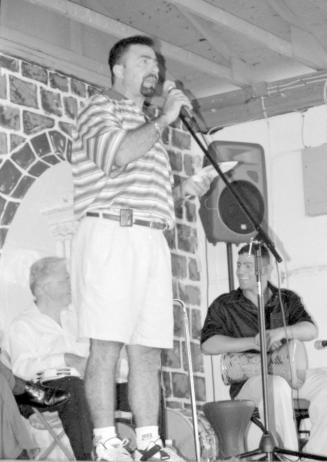Nehme Atallah
Nehme Atallah is a Lebanese singer based in Waterbury, Connecticut. He sings many kinds of Arabic music - traditional, popular and liturgical music. Nehme leads the choir and sings in the Mass every Sunday at Our Lady of Lebanon Church, Waterbury, as lead cantor. He can also sing Islamic music and has done so in mosques. Previously he had a band and still sings solo at parties, weddings, celebrations. Nehme always performed at the opening of the Mahrajan held at the Ehden Lebanese Club annual festival, singing the Lebanese national anthem and folk and liturgical songs important to that town in Lebanon.
Nehme took music lessons when young in Lebanon at a music school so he is formally trained in the complicated Arabic keys. He joined Arabic music bands in Lebanon, and sang in church in Lebanon. Twenty-five years ago he was taught by Prof. Nassir, in Connecticut in an apprenticeship; the teacher played the oud and Nehme would sing.
Church music and more popular or classical Arabic music have the same sounds but different texts. Nehme was an altar boy and sang in the choir; his father sang church music and the whole family sang in the choir both in Lebanon and in Connecticut. “My father asked me to start singing with him in church, and I did it, and since then I have worked with my children – three boys, and my nephews (and one niece) including this apprentice John, he’s the best. So this program will keep the family tradition going.” Nehme taught his nephew John Atallah liturgical and Lebanese folk singing under the Southern New England Traditional Arts Apprenticeship Program Years 13 and 14 (2010-2012), and John became able to sing the liturgy for an entire church service on his own at that time.
“Back when I came to the US in 1986, no one was singing at Our Lady especially during communion. I started singing by myself, no one asked me! We improved the music in the church here, now I have someone playing on the organ to accompany me. Now our musical liturgy is so well known that we are shown on national TV, and I am asked to sing at the Maronite churches around western Connecticut. An Aramaic scholar from Yale visited the church - he played the organ and I was singing, he praised my work even though he is an expert and I am not formally trained. My voice is in the music – I have experience, not formal. I enjoy to give my experience to someone else, to tell him how to be a singer, it is not enough to be a singer – you have to put the heart in it. The music goes from my heart to my brain, not the other way!” (CCHAP interview 2010)

